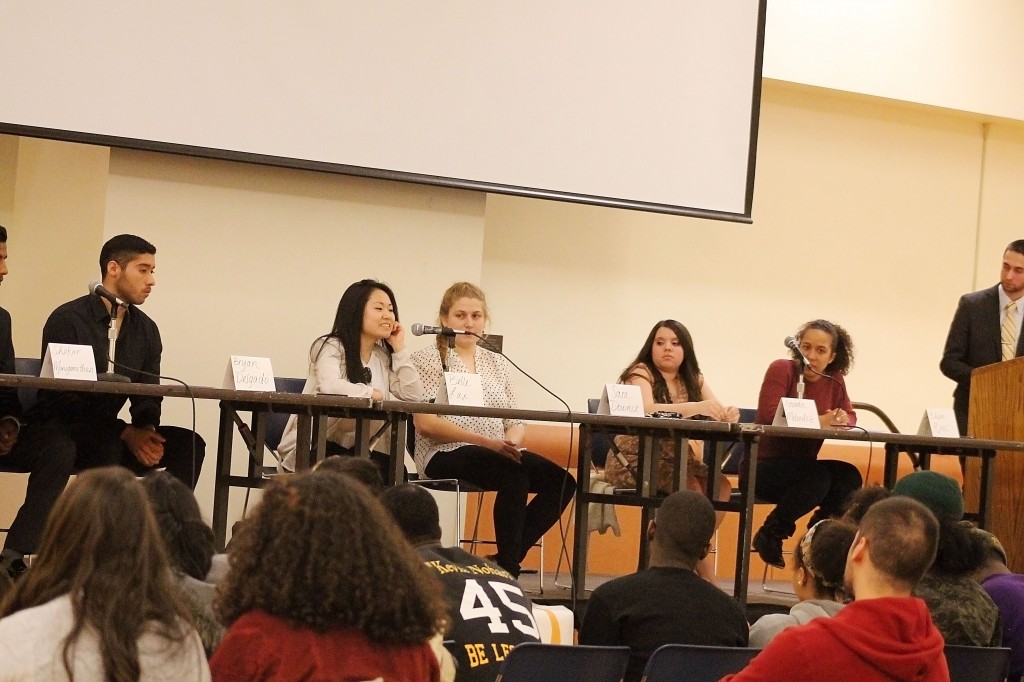
On Tuesday night in the Mandela Room, students shared their firsthand experiences with microaggressions and discrimination on campus.
“Diversity is Strength: Binghamton’s Microaggression Project” aimed to highlight Binghamton University students’ own run-ins with intolerance from their peers. Hosted by the Binghamton Association of Mixed Students (BAMS), the Multicultural Resource Center (MRC) and the Office of Diversity, Equity and Inclusion (ODEI), the groups offered faculty and student speakers an opportunity to talk about ways to overcome nuanced prejudices.
The event opened with 17 photographs of undergraduates holding whiteboards with handwritten messages. The statements described the microaggressions, or unintentional acts of discrimination, that have been committed against them. Comments ranged from “’you don’t look like a lesbian,’” to, “I am from Iraq, that doesn’t make me a terrorist,” to, “having an opinion does not make me a ‘sassy black woman.’” The students stood next to their photographs and discussed their experiences with attendees.
Olivia Avila, a member of BAMS and a junior majoring in engineering, spoke about the difficulty of reconciling her white skin and Puerto Rican heritage with both her peers and family.
“When someone says you don’t possess a certain look or trait of your heritage, it makes you feel like you’re less of a person,” Avila said. “But it has helped me embrace myself and realize that their ignorance doesn’t have to be mine.”
Students like Mariam Saeed, a senior majoring in philosophy, politics and law, discussed her family’s experiences as Muslims in a post-9/11 society.
“We realize that you’re treating us differently,” Saeed said. “You don’t see white people being selected for extra screenings at the airports, at least in the same numbers. It’s subtle things that make people of color feel different. And we’re not going to let that slide under the rug.”
The showcase was an effort to make people more conscious of their actions, said Shekar Muruganathan, president-elect of BAMS and a sophomore majoring in economics.
“We want this to be a learning experience and a way to see all the cultures we have at Binghamton,” he said. “We have so many different kinds of people on campus, and we want to make people a little less ignorant and open their eyes.”
Nicole Sirju Johnson, associate chief diversity officer of the ODEI, spoke at the event. She said that while others’ ignorance is troubling, ignoring the problem will only perpetuate disrespectful behavior and overreacting to the issue will only exacerbate stereotypes and discrimination. Instead, she said, educating microaggressors about the effects of their actions will benefit everyone in the long-term.
“Responding appropriately is an ongoing process, you’re not always going to get it right,” Johnson said. “It’s important to remember we’re all learning. Cultural competency is for everyone. Your attitude leaks, so be positive.”
A volunteer panel of six student presenters answered audience questions and opened the floor for attendees’ to tell their stories.
Panelist Amanda Melendez, an undeclared freshman, said it was important to separate oneself from prejudices others might have.
“We can all be from different backgrounds, but don’t let that limit yourself,” she said. “Diversity is not a concrete thing. You should be able to identify yourself however you want. These stereotypes are not you.”


